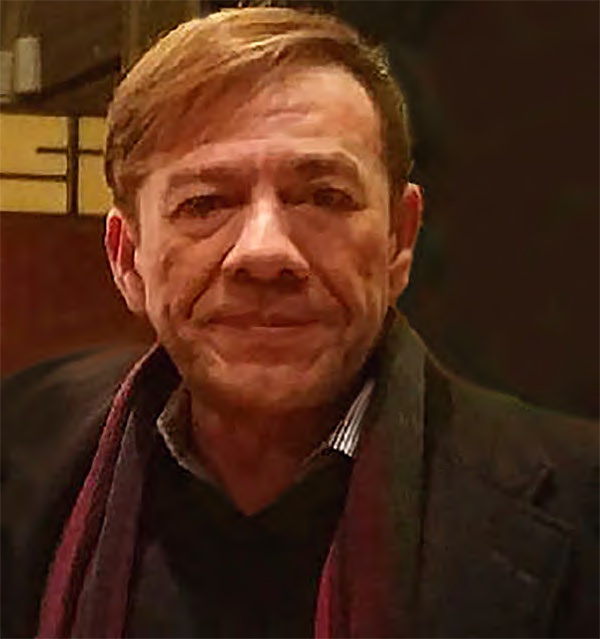






Herberth S. Rivera
LMFT #51831, MS, SAP 415-233-2192
herberth@bapmft.com
Therapy – Family – Individual – Couples – Group Facilitation – Relationships – Recovery – Guest Lecturer and Speaker
For the past several years, I have conducted therapy, training and education in community settings. I work with individuals of diverse backgrounds, couples and families whether traditional, alternative or blended treating a variety of issues including anxiety, depression, life transitions, and recovery from alcoholism/addiction. I also participate and collaborate with psychiatrists, social workers, and other mental health and medical providers throughout the bay area. My approaches depend to some extent on the needs and personal inclinations of clients. Some of my work includes: cognitive behavioral therapy, humanistic, attachment, object-relations, family systems, and others, including spirituality within the context of recovery in particular,
I graduated Magna Cum Laude with a BA degree from SFSU where I took classes in philosophy, history and the humanities. In 2005, I went on to receive a Master’s of Science degree in Counseling Psychology from Dominican University. During my early career, I worked as a behavioral consultant for a program focused on the reunification of parents and their children separated in family law procedures.
I also worked as an alcohol/addiction counselor at Ohlhoff Recovery Programs in the San Francisco Bay Area where I became program director for their Marin Outpatient and Adolescent program in Marin County. Eventually, I became Program Director for the Henry Ohlhoff House, a residential treatment program for workingmen in San Francisco.
In 2009, I had the opportunity to help launch Marin Outpatient and Recovery Services in Marin County and became its first Program Director. In 2010, I joined The Sequoia Center as a Family Case Manager and Family Therapist.
I also make presentations on the subject of addiction, recovery family dynamics, relationships, and the quest for a meaningful life among other subjects. I have been a guest lecturer a various institutions including the Wright Institute in Berkeley.
In the past, I’ve had the good luck of having volunteered at homeless shelters in San Francisco and have been a volunteer tutor for junior-high and high-school newly immigrant students. Similarly, I had the chance to work in the Mayan highlands as Co-Executive Director of an institution dedicated to the preservation of the Lacandon rainforest and the Mayan-highland culture.
Currently, I also supervise master level graduate interns working towards their licensure requirements. I’m available for consultation and can be reached at 415-233-2192 or via email at Herberth@BAPMFT.com
 Individual
Individual
Commonly in individual therapy people examine their thoughts, feelings, bodily sensations, personal developmental and family history, present and past relationships and so on. Through these means people can safely explore and identify areas of their life where they can improve their capacity to function better. Common areas individuals seek insight, understanding and change are: relationships, work, life’s goals, one’s life purpose and meaning, one’s contribution to self and others.
Common areas in which individual psychotherapy may be helpful are:
- Relationship Issues
- Substance abuse and/or other addictive behaviors
- Depression or Sadness
- Anxiety and fears
- Sexuality
- Spiritual Issues
- Life Adjustment Issues (divorce, marriage, illness, recovery)
- Trauma
- Adolescent Issues
- Personal Growth & Exploration
- Peak Performance Enhancement
- Stress-management
- Work-Life Balance
- Self-esteem / Confidence Issues
In Individual therapy I meet with individuals to assist them in dealing with their symptoms. At the same time we work jointly on the individual’s typical aim of achieving better outcomes in their lives. This often involves learning new skills, practicing new behaviors, working through old issues, perhaps grieving, or letting go of things that no longer serve a person in the present. Some of the skills and behaviors typically learned include: Improving the ability to relate to others and develop healthy relationships, learning better adaptive coping and problem-solving skills, resolving inner conflicts or potentially dysfunctional thinking, expressing and tolerating feelings, furthering of cognitive and emotional development.
 Couples
Couples
Commonly in individual therapy people examine their thoughts, feelings, bodily sensations, personal developmental and family history, present and past relationships and so on. Through these means people can safely explore and identify areas of their life where they can improve their capacity to function better. Common areas individuals seek insight, understanding and change are: relationships, work, life’s goals, one’s life purpose and meaning, one’s contribution to self and others.
 Family
Family
From a therapeutic perspective, a main idea about family therapy is that the family can be thought of and viewed as a system. That implies that what is happening to one person in the family system affects other family members. Whether it is something happening that is causing stress, discomfort, difficulty, or whether crisis, conflict, loss or other events may be affecting the family, family therapy affords a forum, and an important opportunity to address such issues.
In general, I assist the participant family members in examining, exploring and interpreting their various interactions, communication styles, and emotional dynamics involved in their family system. In cooperation with the family members involved new and better adaptive behaviors are learned, explored and practiced. Naturally, a better understanding of the motivations and actions of self and others (insight) is typically gained during family therapy.
Traditional, alternative, and blended families can be assisted in family therapy to improve communication, develop better coping skills, and learn new behavioral patterns conducive to better adaptive behaviors and insight.
 Recovery
Recovery
For many years now, alcoholism and addiction to other drugs have been considered a chronic illnesses that affects individuals biologically, psychologically and socially (biopsychosocial model).
Psychotherapy can benefit people either considering recovery or in the process of recovery. In psychotherapy unresolved issues, conflicts, fears and goals can be explored, approached and dealt in a safe and nurturing environment. In collaboration with the therapist, clients can learn new coping strategies, new behaviors, gain better insight and awareness either as stand alone work or as work that supports other efforts such as participation in one of the several12-Step groups. Such work can take place at any point during a person’s recovery regardless of how long they might have maintained continuous sobriety. Similarly, other occurring disorders such as depression, anxiety, family issues and so on can be treated within the context of recovery.
Because alcoholism/addiction is a biopsychosocial chronic illness, it affects those close to the alcoholic/addict in a variety of ways including codependency, hyper-vigilance, anger, sadness, and others. Therefore, I work with couples, families, or individuals on issues brought about by someone else’s (spouse, partner parent, sibling or friend) alcoholism/addiction including lack of trust, dishonesty, communication, broken intimacy, codependency, infidelity and so on.
While recovery is obviously a good event, it can be a disruptive event, a transition. Recovery usually disrupts the way in which family members adapted to the behavior of the person in recovery during the active phase of their alcoholism/addiction. It often takes time, education and the practicing of new behaviors for those close to the alcoholic/addict to understand and to leave the “old ways” and adapt to the new possible ways of being brought about by the process of recovery. There are many good opportunities and possibilities for the alcoholic/addict to get better once he/she goes into recovery. The same opportunities and possibilities to get better open up for those affected by someone else’s alcoholism/addiction once the recovery process is activated.
 Anxiety
Anxiety
People commonly seek therapy due to feeling anxious. While some anxiety is normal, when excessive, it can seriously impact a person’s ability to function optimally in relationships, work, school; it might also interfere with sleeping patterns or eating habits. Common anxiety symptoms include: Racing thoughts, worries, excessive guilt, excessively fearful thoughts, confusion, frustration, shame, despair social avoidance, nervousness, neediness, blaming, and an inability to maintain relations or employment. Common physical symptoms include: sweaty palms, racing heart, difficulty breathing, nausea, trembling, and insomnia.
Some people experience anxiety as a general inability to relax or achieve a sense of well being (a sense of vitality). Others feel as if “the other shoe is about to drop’” (apprehensive expectations) regardless of how well things might be going for them. In some cases anxiety can manifest as phobias, behavioral compulsions that might become obsessive, and even panic attacks.
Anxiety often remains residually in cases where there has been exposure to traumatic stress -whether a onetime traumatic event, or prolonged exposure to chronic low level stressors. It is quite common for anxiety and depression to present simultaneously. Often individuals might confuse anxiety symptoms with depressive symptoms.
Therapy can alleviate the symptoms and deal effectively with the sources of anxiety. Therapy can help individuals understand the source of their anxiety, present and practice tools to deal with anxiety such as mindfulness, cognitive relaxation, cognitive and behavioral strategies, to name a couple.
In some cases medical practitioners might prescribe psychotropic medication specifically for the treatment of anxiety. These medications in combination with therapy are a very effective way of dealing with anxiety. I often work in coordination with psychiatrists and other medical providers in the provision of therapeutic services.
 Life Transitions
Life Transitions
People experience changes in a variety of ways depending on the type of changes involved and personal preferences. Some changes are generally predictable- kids going to college; retirement- others are unpredictable sudden lay off, sudden breakup or divorce, unexpected illness and so. Some of these changes might even be traumatic, an unexpected death of a loved one, for example. Often, whatever the changes might be, we usually have to come to terms with it, process the implications and set some sort of new direction.
The process of moving from what it was to what it is or could be is a transition that usually requires a process of examination, evaluation, adaptation, and exploration of new ways of thinking and acting in some areas of our lives. Often the initial feelings of anxiety or stress due to accompanying feelings of grief, loss, feeling a loss of control during transition periods, with some work give way or lead to better or more refined internal order of values, meaning and priorities. It is possible to face life transitions with a sense of wonderment instead of obfuscation.
I, like many others, believe that a great part of being human consists of making meaning of our lives. During the transitioning journey, I assist people supportively allowing them to explore their own wisdom, and sometimes more directly, but still collaboratively, suggesting ways of accepting something difficult and/or painful, or suggesting new possible ways of finding and developing a satisfying and meaningful life. Examples of some of life events that might lead to transitions:
- dissatisfaction with current job, career, course of studies, current partner
- marriage
- children arrive or children leave nest
- feeling loss of purpose
- crime – perpetrator or victim
- depression of yourself or someone close
- addiction or recovery
- relocation
- breakup or divorce
- fame or financial windfall
- falling in love
- change in religion
- death of one or more people close to you
- chronic pain
- illness or injury
- loss of job or income
- menopause
- “mid life crisis”
- suicide of someone close
 Other Resources
Other Resources
Neither BAP nor Herberth S. Rivera has a financial arrangement with any of the resources listed here.
![]()
The mission of National Institutes of Mental Health is to transform the understanding and treatment of mental illnesses through basic and clinical research, paving the way for prevention, recovery, and cure.
For nearly 70 years, the National Council on Alcoholism and Drug Dependence, Inc. (NCADD)has been a valuable resource for millions of people struggling with addiction.






 Useful forms
Useful forms